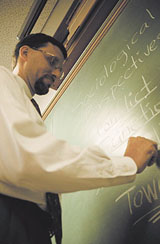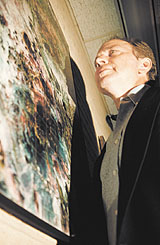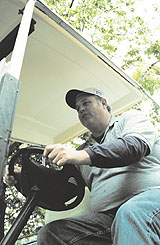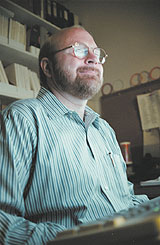When Keith Whitworth threw his line into the Brazos River, he did not expect his hobby to turn into the catch of his life. Instructor of sociology by day, Whitworth, 38, manages his successful Web site by night. "I started freebies4u.com because I needed funds to travel internationally for fly-fishing," Whitworth said. "I had no idea I would enjoy the Internet business so much that it would replace my drive for fly-fishing." Whitworth said he began the business by selling neckties with fly-fishing logos on them. The business was financed by fly-fishing advertisers that offered free coupons, samples and promotions on the Web site. Freebies4u.com is run by 25 employees, as well as software designers and marketing consultants. "Our goal is for freebies4u.com to become the most visited Web site by 2001," Whitworth said. "Obviously, it has grown much larger than just a little hobby." The Web site now offers over 1,500 free items in 30 categories. Whitworth is in his fourth semester of teaching at TCU and will start full time in the fall.
"It has been a long road because I keep getting distracted," Whitworth said. Since high school, Whitworth said he knew he wanted to pursue a teaching degree but got off-course along the way. "After college, I needed money, so I started a greeting card business," Whitworth said. "I've always had an entrepreneurial spirit." For the next four years, Whitworth worked as a marketing liaison for President Clinton's gubernatorial campaign. Whitworth said he urges students to call him by his first name, Keith, because he wants them to feel at ease in and out of the classroom. "My goal as a professor is to be student-oriented," Whitworth said. "I really want to make a connection with students." Whitworth said his family is his first priority but his students come in at a close second. He and his wife, Suzi, have two children. Each semester, Whitworth hosts "The Whitworth Drop-In" at his home. He said students enjoy lemonade, hors d'oeuvres and socializing out of class. Elizabeth Carlock, a freebies4us.com employee who attended TCU, said students really respect Whitworth and enjoy being in his classes. "I've been over to (Whitworth's) house for dinner, and students have come by," she said. "It shows what a good relationship he has with them." Carlock said Whitworth sometimes stays up until 2 a.m. working on business tasks, but she said he wakes up fresh for his classes. "Everyone loves working with Keith - including myself," Carlock said. "He wants everyone to feel like they're important." Whitworth said he admits having difficulty juggling teaching, studying and family time. "My priority will be teaching, and my nights will be spent working the business," Whitworth said. Whitworth still finds time to fly-fish four times a year, but he said his trips are no longer spontaneous. "I don't get to go as much as I used to, and now I actually have to schedule trips three months in advance," Whitworth said. Despite his hectic schedule and hard work, Whitworth said the compromises have been worth it. "I feel like I've fulfilled my destiny," he said.
Natascha Terc
After a full day of classes, Ken Morgan leaves his position as chairman of the TCU geology department and goes home to his wife and two sons. If Morgan is not playing bass guitar for the geology department band, Sump Pump, or coaching his son Hayden's soccer and baseball teams, he is caring for his son Kenton. Kenton was born three months premature and developed cerebral palsy. According to Morgan, having a child with cerebral palsy has changed his outlook on life. "By having Kenton, it has made me more aware that everyone has certain shortcomings and obstacles they have to work through," he said. "I am definitely much more patient and understanding." Cerebral palsy is a group of disorders whose major feature is brain damage, according to the Cerebral Palsy Information Center. Most of the time the damage is done before, during or shortly after birth. Kenton is now 13 and attends regular sixth grade classes. Morgan said Kenton has had over a dozen surgeries in his lifetime.
"One of Kenton's favorite activities besides swimming is horseback riding," Morgan said. "Kenton had to quit riding because his legs were crossed and stiff because of the spasticity." The treatments have given Kenton a new sense of hope, Morgan said. He is now able to ride horses and was even taken off some of his medication. "Our biggest source of physical therapy is provided weekly by All Star Equestrian Foundation," Morgan said. "By going from a wheelchair onto something like a horse and being able to be mobile is a big step for people who are confined to a chair." Morgan recently bought a horse to aid Kenton and began experimenting with non-resistance training. "By using a clicking device, I can train the horse with voice commands," Morgan said. "This allows the disabled rider, who may be too weak to pull on the reins, a simple way to control the horse." Although Morgan is a novice at horse training, he is persistent. "I keep at it hoping this will give Kenton a chance at something normal in life," he said. George Winkley, program director for All Star Equestrian Foundation in Mansfield, said it is miraculous to see the results of a disabled person who has had therapeutic riding. "I have taken people in wheelchairs and seen them actually be able to walk with a cane after working with the horses," said Winkley. The natural movement of a horse actually mimics the sensation of human walking, Winkley said. "By riding a horse, you are using the same muscles in your legs as walking," he said. Winkley also said that people who ride horses also share the same breathing patterns as the horse. "By using their diaphragms and breathing with the horse, students are able to improve basic speech patterns and breath control," Winkley said. "We are working hard to give Kenton every opportunity available," Morgan said. "His main goal is to one day attend TCU. This is definitely attainable."
Kaitie Smith
When the tornados swept through the Dallas/Fort Worth area March 28, Chuck Barley rounded up his neighbors and offered them safety in his ground-floor apartment. When the tornados had passed Barley's residence, a single mother, her daughter and their Chihuahua were safely covered with a mattress in the bathtub. Then Barley had to check on the safety of his beloved TCU. "(Barley) lives in Hurst, but he called to see how the campus and the students were after the tornado," junior theater and radio-TV-film major Justin Garvin said. "Some people would say, 'If I'm not on the clock, why should I be concerned?' "He's one of the most caring people on the staff. He's one of those people that you can call if you have trouble." And TCU does call. Barley is on 24-hour call with his job on the emergency response team. He is required to wear a pager at all times. Two times during Christmas break, Barley was called in because of floods in Clark Hall. "Twenty-one rooms were flooded, and we had to move furniture and dry the carpet before it was ruined," Barley said.
"(Barley) is a dedicated worker," Oliver said. "He works hard during the day, so you don't have to worry about him goofing off or not getting a job done." Barley said his desire to get things done can be a downfall. "There is an evil Chuck, who just does what it takes to complete a task," he said. "I guess that is bad that I have such tunnel vision, but it gets the job done." Barley said he used to sneak into TCU football games when he was a child, and he always wanted to play football in a Frogs' uniform. Instead, Barley played football at the University of Texas-El Paso, but his eligibility ran out when he had completed only 113 hours. Barley said he did not finish his degree because he was married and money became important. Barley worked on oil fields and spent time as a youth director for a church in Parker County. At the church, Barley met Oliver. Barley mentored Oliver's two sons through the youth program, and Oliver found a future employee. "(Barley) is one of the finest men I've ever met," Oliver said. "He's a good mentor because of his likable qualities. Kids naturally look up to him." Barley has received the same response from students at TCU. Garvin went to work with Barley after having only met him for a brief conversation. Garvin said Barley and Roger Fisher, director of residential services, were talking about all the new residence halls and renovations. "I walked by, and (Barley) said, 'I want him. It looks like we'd get along,'" Garvin said. Oliver said Barley knows something that helps him to relate to all types of people. "We were driving along in the car one day, and 'Amazing Grace' came on the radio," he said. "(Barley) recounted the entire history of how the song was written and what it meant to those during times of slavery." Oliver said Barley missed his calling to teach history. But Barley believes he teaches it in a different format from a classroom. As he continuously checked his pager, Barley said he loves computers, geography, economics, the stock market and especially, politics. Along with teaching these topics to anyone who will listen, he also teaches a "sweeping philosophy" of optimism. Despite the death of his wife and father within 10 months of each other in 1997, Garvin said Barley lives as though everything is just fine. "It's all good and getting better," Barley said. "At times in my life, like 1997, the wolf wasn't just at my door, he was licking my feet. But the only way to lose is if you give up. "If you're still swinging, they can't beat you. Sometimes I have to make a conscious effort to be happy. If you let yourself get down, you can make yourself miserable at your job." Garvin said everyone knows Barley's philosophy. "When we got our new uniforms, everyone got denim shirts with their name on it," Barley said. "Mine said, 'Chuck, it's all good.'"
Rusty Simmons
By Kristina Iodice Skiff staff When Jim Mayne first came to TCU in 1974 as a student interested in computers, there wasn't even a computer science department. He certainly did not plan on staying at the university for 26 years. "It's very conducive to creativity here," he said. "It's also nice to be around students and faculty. You have a whole pool of experts that are more than happy to talk about their field." Mayne, now TCU's senior network engineer, has watched technology advance during his time at TCU. He said he can recall when computer systems were changed using a deck of "cards" between midnight and 5 a.m. Cards were the early forms of floppy disks. Work on the network had to be done while everyone was sleeping, Mayne said. "Cards shot across the room everywhere, and it is very difficult to get them in sequence again," he said. "Fortunately, it was (the) last time (we) were going to have to program this machine." Mayne's responsibilities include designing and monitoring the network infrastructure, maintaining network security and exploring new technologies. The network infrastructure starts at any user's computer on campus and the cable that runs from that machine to the jack in the wall, Mayne said.
Mayne makes sure the network stays secure, sharing troubleshooting duties with Tony Fleming and Stephanie Polly in Information Services. "I work with network security for both our students' security if they have complaints or (if) other schools or other companies have complaints about our students," he said. Mayne began his professional career at TCU when he did some graduate teaching assistantships in the late 1970s. He then did graduate training in what is now Information Services. In 1980, he moved into a full-time job working with the emerging computer network. Many students are unaware of Mayne's contributions in the small, almost hidden office with Ella Fitzgerald singing in the background. "People begin to know I exist when the Internet link is down or congested or they're having trouble connecting from their dorms rooms or the labs," he said. Since so much equipment is used to create the network, it is often difficult to find the cause of a problem. Some faculty will call Mayne directly with problems but most won't, he said. "The most difficult part is when something does go wrong, it affects the entire campus," he said. "As soon as something happens we hear about from all over campus. You're under a lot of pressure to fix the problem as fast as possible, and it's not always a simple matter." In the early stages of computer development, use was limited to scientific research and businesses because they were expensive, Mayne said. Watching the technology evolve has been exciting for Mayne, he said. "Now everybody has a high-speed computer on their desk that is much more powerful than the TCU mainframe was when I started," Mayne said. Of course, the improved technology means even more complicated problems, Mayne said. The problem he worries about most is the issue of security, especially since the Web has made information so easy to obtain. "TCU students could be giving out their information," Mayne said. "It could be used to find them, to target them for marketing efforts, to indicate some pattern of behavior." Mayne, and others from Information Services, focus on the security of the network as a whole. He said the foremost concern is to prevent outside users from making the network unavailable or accessing administrative systems that have personal information about students and faculty. As for the future of the TCU network, Mayne has high expectations. He said there will be higher speeds to connect to other networks and more applications that expand the graphics and reality. "We will be participating in discussions across the globe that we don't have to physically attend," Mayne said. Down the hall from Mayne's office, in the room that houses the university mainframe computer and the connections to external networks, is a monitor and small video camera. With a single click, the computer can call England, Japan or the Universidad de las Américas for live video conferences - all done via computers. "We're looking at wireless technologies so students can use the computer anywhere in the library, anywhere in the Student Center, even outside in the mall and be connected to our network," he said.
Kristina Iodice |
| The TCU Daily Skiff © 1998, 1999 Credits |
 With two master's degrees under his belt,
Whitworth said he is working on a third in cognitive technology and is
finishing up his doctorate in sociology.
With two master's degrees under his belt,
Whitworth said he is working on a third in cognitive technology and is
finishing up his doctorate in sociology. One of the main symptoms of cerebral palsy
is spasticity. Spasticity is a word used to describe a symptom in which
the muscles are in a persistent state of involuntary reflex activity.
One of the main symptoms of cerebral palsy
is spasticity. Spasticity is a word used to describe a symptom in which
the muscles are in a persistent state of involuntary reflex activity. Richard Oliver, assistant director of facilities,
said Barley also helps with the Micro Fridge program and cafeteria repairs,
oversees two warehouses and does minor kitchen appliance repairs.
Richard Oliver, assistant director of facilities,
said Barley also helps with the Micro Fridge program and cafeteria repairs,
oversees two warehouses and does minor kitchen appliance repairs. "All of those lines are connected,"
Mayne said. Eventually you get to the campus backbone which is more of
a mesh because it isn't a straight line; it involves five key pieces of
equipment that are interlinked with each other."
"All of those lines are connected,"
Mayne said. Eventually you get to the campus backbone which is more of
a mesh because it isn't a straight line; it involves five key pieces of
equipment that are interlinked with each other."